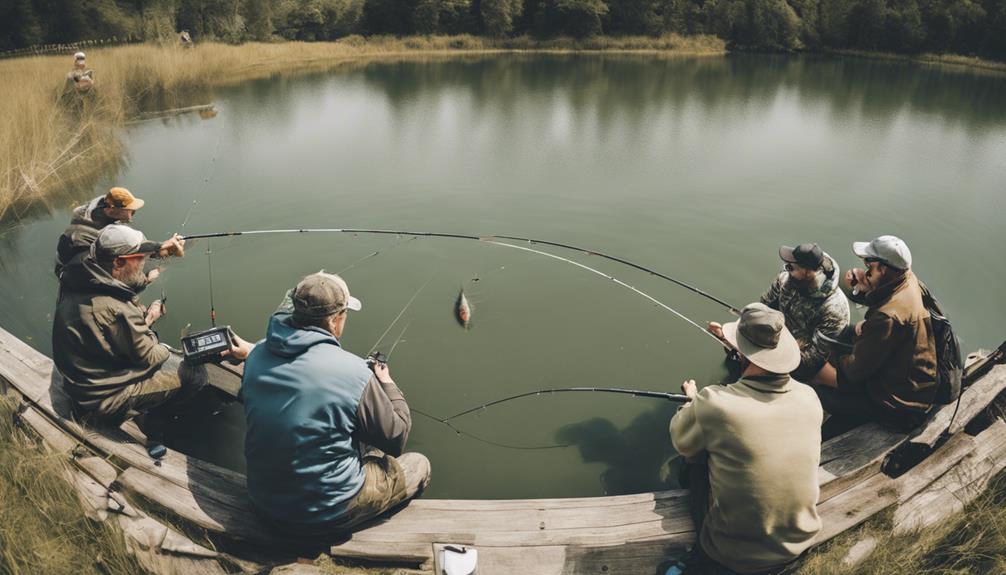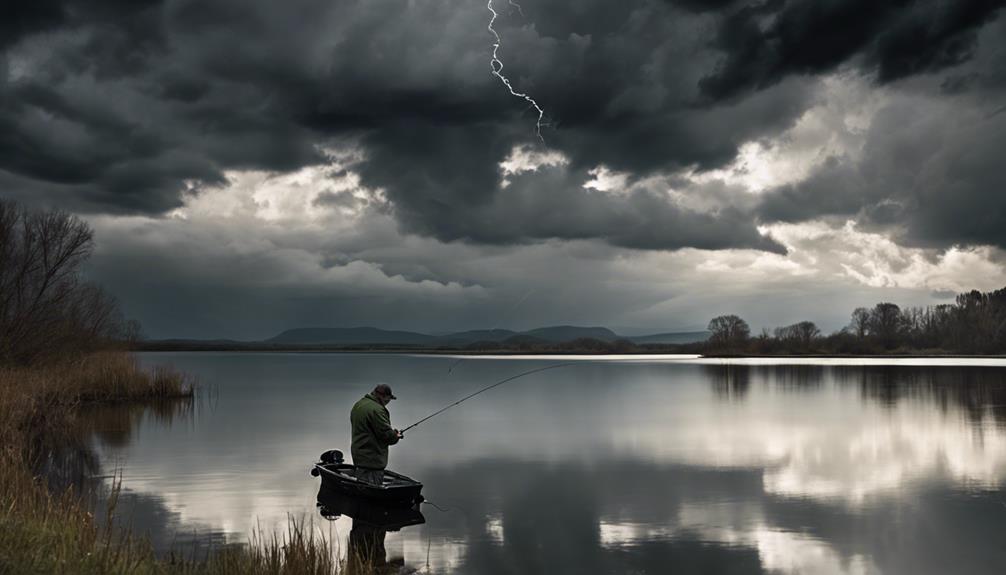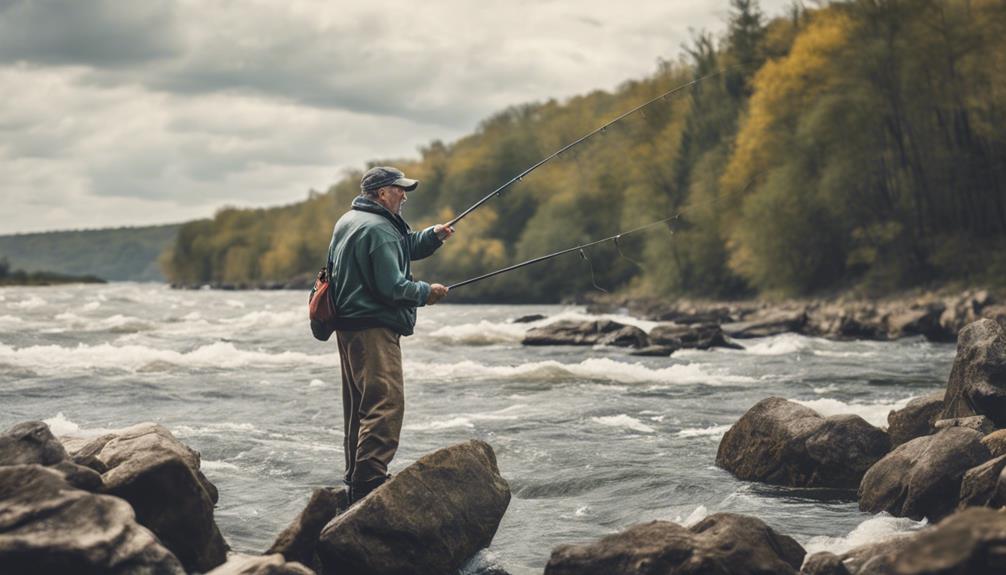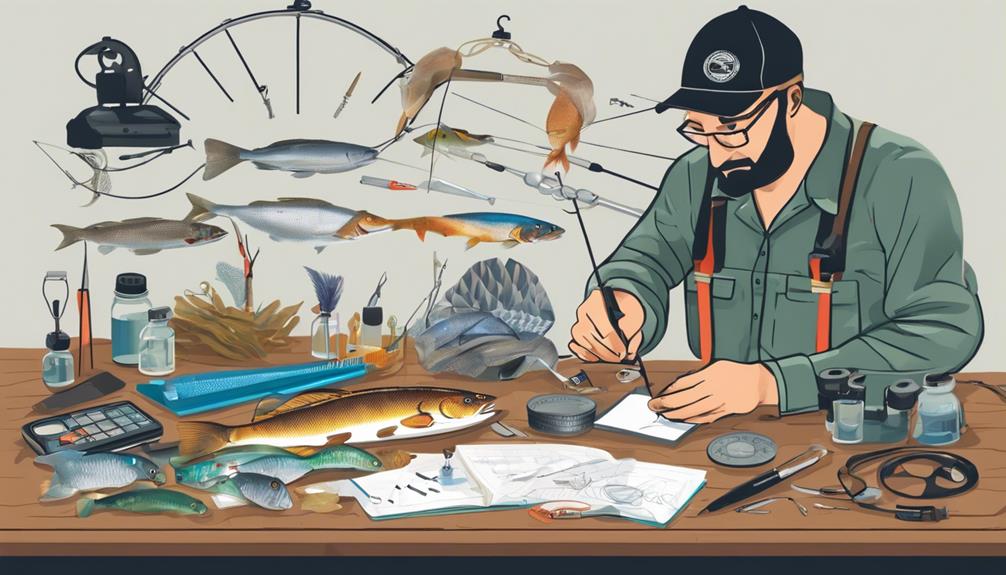When casting your line into the competition waters, understanding the rules and regulations of competitive angling is crucial. Have you ever wondered how different angling organizations enforce their regulations and what impact they have on the sport?
From size limits to gear restrictions, each rule serves a purpose in ensuring fair play and preserving aquatic ecosystems. But what happens when rules conflict or when anglers push the boundaries?
Stay tuned to learn more about the intricate web of guidelines that govern the world of competitive angling.
History of Competitive Angling Regulations
Competitive angling regulations have evolved over centuries to ensure fair and ethical practices among participants. The evolution of these regulations has been driven by the need to standardize rules across different regions and countries, ultimately leading to the establishment of international standards. The history of competitive angling regulations dates back to ancient civilizations where fishing contests were held to showcase skill and prowess. As the popularity of angling grew, so did the need for clear guidelines to govern competitions.
In the modern era, the evolution of competitive angling regulations has been marked by efforts to promote conservation and sustainability. International standards have been developed to address issues such as catch limits, gear restrictions, and tournament etiquette. These regulations aim to strike a balance between the competitive spirit of angling and the responsibility to preserve aquatic ecosystems for future generations.
Through collaborative efforts between angling organizations, government agencies, and conservation groups, a framework of rules and regulations has been established to govern competitive angling events worldwide. Adherence to these standards not only ensures a level playing field for all participants but also promotes the values of sportsmanship and environmental stewardship within the angling community. As angling continues to evolve, so too will the regulations that govern it, adapting to new challenges and opportunities in the ever-changing world of competitive fishing.
Types of Competitive Angling Events
Exploring the various types of angling events offers insight into the diverse challenges and strategies anglers face in the competitive fishing world. Angling techniques and tournament formats play a crucial role in shaping the dynamics of these events.
Angling events can vary widely based on the techniques allowed. Some tournaments focus on a specific technique, such as fly fishing or bait casting, testing anglers' proficiency in these specialized methods. These events challenge participants to adapt their skills to different approaches, showcasing their versatility and expertise in various angling techniques.
Tournament formats also greatly influence competitive angling events. From catch-and-release competitions to big fish contests, each format brings its own set of rules and objectives. In catch-and-release tournaments, anglers aim to catch as many fish as possible within a specified time, emphasizing conservation and quick, careful handling of fish. Conversely, big fish contests prioritize landing the largest fish within a given period, requiring anglers to target trophy-sized catches.
Fish Size and Weight Regulations
To ensure fair competition and compliance with conservation efforts, anglers must adhere to specific regulations regarding fish size and weight during competitive angling events. Adhering to these rules not only ensures a level playing field for all participants but also contributes to the sustainability of fish populations for future generations.
- Catch Limits: Competitive angling events often impose catch limits on participants to prevent overfishing and help maintain healthy fish populations in the area. Anglers must abide by these limits to promote conservation efforts and ensure the long-term viability of the sport.
- Measurement Accuracy: Accurate measurement of fish size and weight is crucial to determine compliance with regulations. Anglers are typically required to use approved measuring tools and scales to ensure precise and consistent measurements. Any discrepancies in measurement accuracy can result in penalties or disqualification from the event.
- Compliance Verification: Tournament officials may conduct random checks or inspections to verify that anglers are following fish size and weight regulations. These checks help maintain the integrity of the competition and ensure that all participants are playing by the same rules.
- Penalties for Non-Compliance: Anglers who fail to comply with fish size and weight regulations may face penalties such as point deductions, fines, or disqualification from the event. These penalties serve as deterrents to prevent rule violations and promote fair play among competitors.
Equipment and Gear Restrictions
Anglers must adhere to specific restrictions on equipment and gear to ensure fair competition and adherence to regulations during angling events. Gear limitations play a crucial role in competitive angling, as they help maintain a level playing field among participants. It's essential to understand and comply with the equipment specifications set forth by the governing bodies to avoid disqualification or penalties during tournaments.
When it comes to gear limitations, anglers need to pay close attention to the type and size of equipment they use. Each competition may have its own set of rules regarding the maximum line weight, hook size, and types of lures or baits allowed. These restrictions are in place to prevent anglers from gaining an unfair advantage over others by using specialized gear that goes against the spirit of fair play.
Furthermore, equipment specifications such as rod length, reel type, and even the use of certain electronic devices may also be regulated in competitive angling. Anglers should familiarize themselves with these rules well before the event to avoid any last-minute surprises or rule violations that could impact their performance.
Ethics and Sportsmanship Guidelines
To uphold the integrity of competitive angling, it's essential for participants to strictly adhere to established ethics and sportsmanship guidelines throughout all aspects of the event. Engaging in fair play and displaying respectful behavior not only reflects positively on individual anglers but also contributes to the overall positive atmosphere of the competition.
Here are four key points to consider in upholding ethics and sportsmanship guidelines:
- Fair Play: Always abide by the rules and regulations set forth by the competition organizers. Avoid any form of cheating or unsportsmanlike conduct that could compromise the fairness of the competition.
- Respectful Behavior: Treat fellow competitors, officials, and spectators with respect at all times. Avoid confrontations or disrespectful language, and instead, focus on maintaining a positive and sportsmanlike attitude throughout the event.
- Integrity: Uphold the highest standards of integrity in your actions and decisions. Be honest in reporting your catches and follow the principles of transparency and honesty in all your interactions.
- Helping Others: Encourage a sense of camaraderie by assisting fellow anglers when needed. Offer help, advice, or support in a friendly and respectful manner, promoting a sense of community and mutual respect among participants.
Environmental Conservation Requirements
Adherence to environmental conservation requirements is crucial for maintaining the sustainability of competitive angling events. Conservation practices play a vital role in ensuring that fishing tournaments don't harm the ecosystem and aquatic life. Sustainable fishing is at the core of these requirements, emphasizing the responsible use of natural resources to prevent depletion and protect the environment for future generations.
Competitive anglers must follow specific guidelines to promote environmental conservation during tournaments. This includes practicing catch and release techniques to minimize the impact on fish populations, using biodegradable fishing gear to reduce waste in water bodies, and respecting protected areas to preserve fragile ecosystems. By incorporating these conservation practices into their angling routines, competitors demonstrate a commitment to sustainable fishing practices.
To further support environmental conservation efforts, participants should be aware of local regulations regarding fishing seasons, size limits, and catch quotas. These rules are designed to prevent overfishing and maintain healthy fish populations. Additionally, anglers are encouraged to pick up any trash or debris they encounter while fishing to keep waterways clean and protect wildlife habitats.
Scoring Systems in Competitive Angling
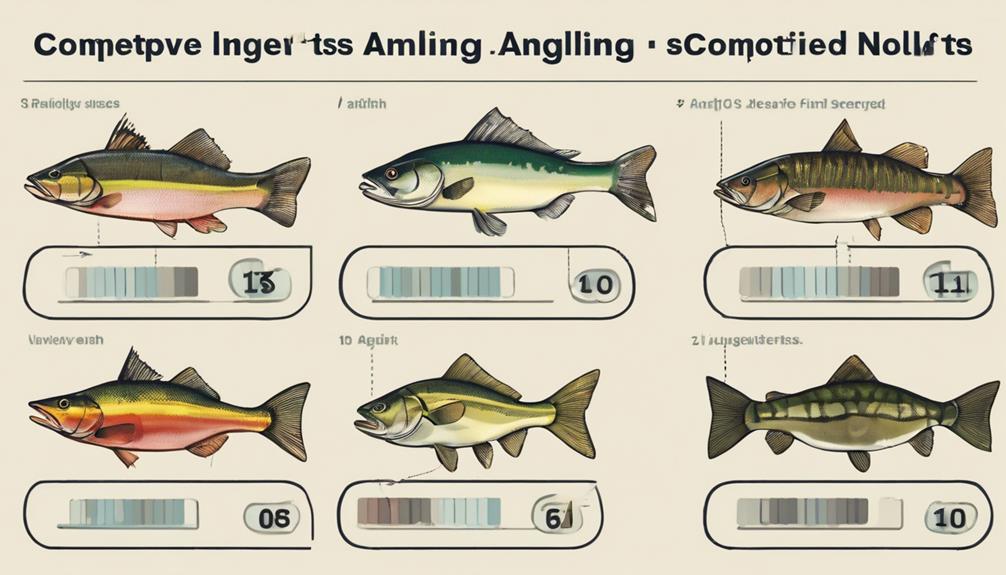
When participating in competitive angling events, understanding the scoring systems is essential for maximizing your performance and achieving success. To excel in these competitions, you must familiarize yourself with the scoring techniques, judging criteria, point allocation, and tiebreaker rules:
- Scoring Techniques: Different competitions may use various scoring techniques, such as total length, total weight, or a combination of both. Understanding which method is being used in the specific event you're participating in is crucial for strategizing your approach.
- Judging Criteria: Judges typically evaluate factors like the size, species, and condition of the fish caught. Knowing how these aspects are being judged can help you target the right fish to earn more points.
- Point Allocation: Points are usually awarded based on the individual or team that catches the largest or most fish within a designated time frame. Learning how points are allocated can guide your decisions on where and how to fish during the competition.
- Tiebreaker Rules: In the event of a tie, there are specific rules in place to determine the winner. Understanding these rules beforehand can prepare you for potential tiebreaker situations and help you adapt your strategy accordingly.
Penalties for Rule Violations
Understanding the consequences of rule violations is crucial for maintaining a fair and competitive environment in angling competitions. Penalty enforcement plays a significant role in upholding fair play and integrity within the sport. When rules are broken, penalties are imposed to ensure that all participants adhere to the established guidelines, thereby leveling the playing field for everyone involved.
Penalties for rule violations can vary depending on the severity of the infraction. Minor offenses may result in warnings or point deductions, while more serious breaches could lead to disqualification from the competition. It's essential for anglers to familiarize themselves with the specific rules and regulations of each event to avoid unintentional violations that could potentially harm their standings.
Consequences for rule violations not only serve as a deterrent but also protect the integrity of the sport. By enforcing penalties consistently and fairly, organizers demonstrate their commitment to upholding the principles of angling competitions. This approach fosters a culture of respect for the rules and ensures that all participants compete on an equal footing.
Frequently Asked Questions
Can I Use Live Bait in Competitive Angling Events?
Yes, you can use live bait in competitive angling events. However, it's important to consider the live bait controversy and competitive ethics surrounding its use.
To ensure fair play and promote sustainable fishing practices, always follow the rules and regulations set forth by the competition. Respecting the guidelines won't only maintain integrity in the sport but also contribute to a level playing field for all participants.
Are There Any Restrictions on the Use of Electronic Fish Finders or GPS Devices During Competitions?
During competitions, there are restrictions on the use of electronic fish finders or GPS devices. These limitations ensure fair play and prevent any one angler from gaining a competitive advantage through advanced technology.
Equipment regulations are strictly enforced to maintain a level playing field for all participants. By adhering to these rules, anglers can compete on skill and strategy rather than relying solely on technology to locate fish.
Are Anglers Allowed to Fish in Certain Areas or Waters During Competitive Events?
During competitive events, anglers must adhere to fishing boundaries set by competition rules. It's crucial to be aware of public access and fishing regulations in specific areas or waters where the event takes place.
Make sure to follow the guidelines to avoid penalties or disqualification. Always stay informed about any restrictions or designated fishing zones to ensure fair play and a successful competition experience.
How Are Tiebreakers Determined in Competitive Angling Tournaments?
In competitive angling tournaments, tiebreakers are determined based on various factors. Weight limits play a crucial role, where the angler with the heaviest total catch usually wins. Scoring is also considered, with points awarded for different fish species.
Weather conditions and time limits can impact the outcome, as some anglers may strategize differently based on these factors. Overall, tiebreakers in competitive angling tournaments are often decided by a combination of these elements.
Are There Any Restrictions on the Type of Fishing Line or Hooks That Can Be Used in Competitions?
When it comes to the type of fishing line or hooks allowed in competitions, there are usually restrictions to ensure fair play. Make sure your reel maintenance is top-notch, and consider the line strength carefully.
Hook sizes and lure selection may also be regulated, so be sure to check the rules beforehand. Adhering to these guidelines will help maintain a level playing field and ensure a successful competition experience.
Conclusion
Now that you understand the rules and regulations of competitive angling, you can confidently participate in events knowing what's expected of you.
By following size, weight, equipment, and ethical guidelines, you can ensure fair play and good sportsmanship. Remember to also prioritize environmental conservation and be aware of scoring systems and penalties for rule violations.
With this knowledge, you're well-equipped to compete in the world of competitive angling. Good luck out on the water!
